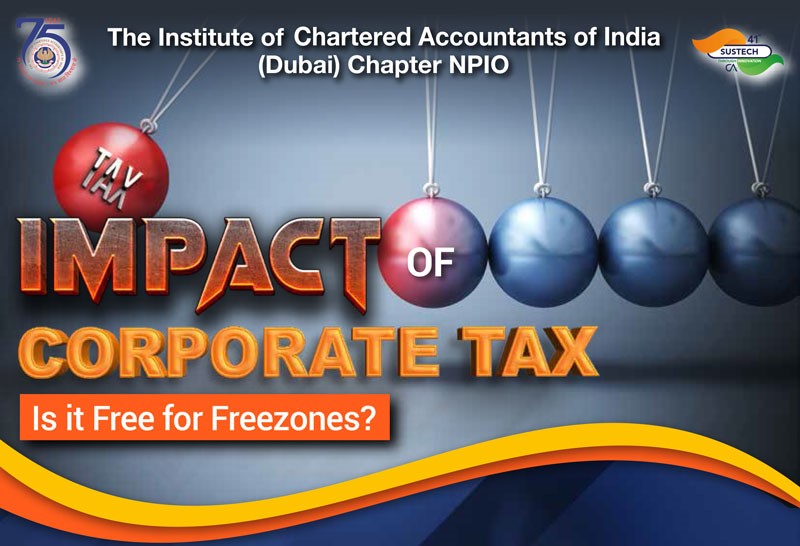The, “Impact of Corporate Tax – Is it Free for Free Zones,” hosted by Institute of Chartered Accountants of India (ICAI) Dubai chapter concluded in Dubai, providing participants with valuable insights into the complex world of recently introduced corporate tax in the United Arab Emirates (UAE). The event aimed to uncover the effects of corporate tax regulations on Free Zones within the UAE and shed light on their role in shaping business dynamics, influencing investments, and driving economic growth.The event offered stakeholders valuable insights into navigating the intricate landscape of UAE’s corporate tax regulations in Free Zones, aiding informed decision-making and strategic planning to optimize their operations in the region. In the UAE, corporate tax was implemented from 1st June 2023 .
Known for its business-friendly atmosphere, the UAE has attracted global investors seeking favorable taxation policies. The introduction of excise duty in 2017an corporate tax in 2023 marked a pivotal step in the nation’s economic journey. With a corporate tax rate of 9%, considerably lower than the worldwide average of 23%, the UAE’s distinctive tax structure positioned it as an attractive destination for investment.
ICAI, as the largest professional body in the UAE, played a key role in raising awareness and understanding of significant financial matters for businesses in the region. The event provided participants with an overview of the Corporate Income Tax (CIT) law and explored the motivations behind opting for increased taxation within the UAE. Experts navigated through the intricacies of Controlled Foreign Company (CFC) rules, Transfer Pricing requirements, and the implications of income from immovable property in Free Zones.
A notable feature of the UAE’s corporate tax framework is the way it treats income from immovable property in Free Zones. Income derived from commercial property transactions between Free Zone entities benefited from a zero percent tax rate, encouraging business activities within Free Zones. In contrast, other forms of income fell under the standard 9% corporate tax rate, ensuring contributions from non-Free Zone transactions to the national revenue.
While the scope of the 0% tax rate for certain transactions within Free Zones might not have been as extensive as initially anticipated, experts discussed its potential impact on the UAE’s appeal as a business hub. Additionally, the criteria for qualifying activities, especially in comparison to the Qatar Financial Centre (QFC) regime, drew attention. Anticipating further guidance and considering global tax planning strategies such as Base Erosion and Profit Shifting (BEPS), the UAE’s tax policies are expected to evolve in the future.
The recent introduction of the new corporate tax law in the UAE, effective from June 1, 2023, marked a significant shift in the nation’s economic landscape. With a low tax rate of 9% on profits exceeding AED 375,000, this change is expected to promote transparent financial reporting among businesses, aiding economic transformation and reducing reliance on oil-based revenues. While the law offers benefits, it also presents challenges for individuals owning multiple sole-ownership companies.
In conclusion, the event “Impact of Corporate Tax – Is it Free for Free Zones” served as an essential platform for stakeholders, business leaders, and financial experts to explore corporate tax regulations within UAE’s Free Zones. By examining both opportunities and challenges arising from these regulations, participants gained a deeper understanding of this critical aspect of the business landscape in one of the world’s most dynamic cities.










